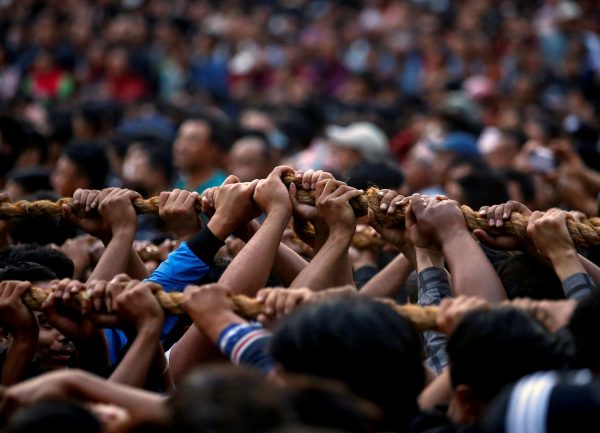Many of Nepal’s current leaders were parachuted into federal politics without ever participating in the leadership development process from village-level politics. Akin to the former monarchy and feudal lords, politicians ensured that their spouses, children and relatives were given cushy government positions. Non-relatives managed to buy such positions through donations or by partnering with politicians in government contracts or business.
The swamp of federal politics is unfortunately buttressed by some development organisations and NGOs, which maintain the culture of indirect payments that keeps the federal system intact. These include renting buildings or vehicles of relatives of politicians or bureaucrats, funding junkets with generous allowances and providing scholarships or subsidies to educate children. This brings about a culture of capital city-centric politics where the whole country wants to get a piece of the capital pie — resulting in Kathmandu bursting with people.
Young leaders rising through local government pose a threat to the current crop of federal leaders and the patronage politics that dominates the capital. The federal leadership is so devoid of young leaders that at 60 years of age, politicians are still referred to as ‘youth leaders’. The upcoming elections are a chance to put Nepal on a path towards more broad-based development.
If a political settlement can be reached with the agitating Madhesi parties, then the elections will be nation-wide. Otherwise in some places — especially in Province 2 — it will be difficult to conduct polls. The power-hungry Madhesi leaders, including those who lost past elections, project themselves as the real leaders fighting the cause of the Madhesi people, but their credibility continues to be questioned. Apart from this issue, it seems Nepal is all set for the local elections.
The local elections will hopefully result in three fundamental changes. First, the opportunity for promising young people to compete for positions should result not only in better government but also better opposition. There has been a complete absence of opposition in Nepal’s democratic processes as the country has long been ruled by a syndicate of political parties in different permutations and combinations. Some of the new characters show the potential to be federal leaders who can take the national stage in the parliamentary elections of 2023.
Second, resources controlled by the federal government could not be spent in the past due to the absence of requisite local machinery and accountability. If local elections ease this bottleneck, the more than US$8 billion available to spend each year could fund transformative infrastructure development and social service delivery.
Third, if the local elections bring with them better allocation of capital, the crowding in Kathmandu will lighten as people find newer urban centres to focus on. Countries grow best when development is geographically inclusive with multiple growth centres developing all over the country.
When the local elections take place, the prime minister will most likely be Sher Bahadur Deuba, who dissolved local government in 2002. From 1998 to 2002, leaders from his and other political parties watched the tremendous devolution of power to the village level. These villages took control of affairs and resources from federal leaders, with mayors often delivering effective governance. The success of devolution alarmed the federal leaders, who then decided to bury local governments without ever wanting to revive them.
Devolution of power in Nepal is a tough issue lacking social acceptance. Nepali culture is one where people do not want to give up the power they enjoy in their personal lives until they die. Devolution is a threat to treasured powers because successful local governments will incline citizens to seek devolution in other areas as well. There will thus always be a section of people who will stand in the way of devolution. This will the key challenge to overcome.
Nepal has a great opportunity to take charge of its destiny by allowing the local elections to happen and pave the way for a new crop of leaders. Hopefully the opportunity won’t be squandered.
Sujeev Shakya is Chair of the Nepal Economic Forum. You can follow him on Twitter at @sujeevshakya.


Thanks for an informative analysis. I look forward to a follow up after the upcoming local elections in May in order to learn to what extent power might devolve to the local level. If this happens, could more funds be spent on the recovery from the 2015 earthquake? I recall having read that the recovery process was lagging very badly.
Thanks for your comment
Surely, will do a follow up comment. more about my Nepal analysis is also available at http://www.sujeevshakya.com